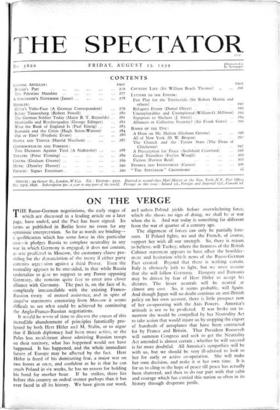ON THE VERGE T HE Russo-German negotiations, the early stages of
which are discussed in a leading article on a later page, have ended, and the Pact has been signed. Its terms as published in Berlin leave no room for any optimistic interpretation. So far as words are binding— a qualification which has some force in this particular case—it pledges Russia to complete neutrality in any war in which Germany is engaged; it does not contain, as was predicted in Moscow, the customary clause pro- viding for the denunciation of the treaty if either party commits aggre;sion against a third Power. Even the neutrality appears to be one-sided, in that while Russia undertakes to g:i.re no support to any Power opposing Germany, she remains quite free to enter into closer alliance with Germany. The pact is, on the face of it, completely irreconcilable with the existing Franco- Russian treaty of mutual assistance, and in spite of singular statements emanating from Moscow it seems difficult to see what could be achieved by continuing the Anglo-Franco-Russian negotiations.
It would be waste of time to discuss the causes of this incredible abandonment of principles fanatically pro- fessed by both Herr Hitler and M. Stalin, or to argue that if British diplomacy had been more active, or the Poles less recalcitrant about admitting Russian troops on their territory, what has happened would not have happened. It has happened, and the whole immediate future of Europe may be affected by the fact. Herr Hitler is freed of his dominating fear, a major war on two fronts at once, and confident as he is that he can crush Poland in six weeks, he has no reason for holding his hand for another hour. If he strikes, there lies before this country an ordeal sterner perhaps than it has ever faced in all its history. We have given our word, and unless Poland yields before overwhelming force, which she shows no sign of doing, we shall be at war when she is. And war today is something far different from the war of quarter of a century ago.
The alignment of forces can only be partially fore- seen. If Poland fights, we and the French, of course, support her with all our strength. So, there is reason to believe, will Turkey, where the firmness of the British Cabinet statement appears to have offset the bewilder- ment and hesitation which news of the Russo-German Pact created. Beyond that there is nothing certain. Italy is obviously loth to fight, but we must assume that she will follow Germany. Hungary and Rumania may be driven by fear of Herr Hitler to accept his dictates. The lesser neutrals will be neutral at almost any cost. So, it seems probable, will Spain. And though Japan will no doubt continue an anti-British policy on her own account, there is little prospect now of her co-operating with the Axis Powers. America's attitude is not to be predicted. If war broke out to- morrow she would be compelled by her Neutrality Act to take action that would injure us by stopping the export of hundreds of aeroplanes that have been contracted for by France and Britain. That President Roosevelt will summon Congress and seek to get the Neutrality Act amended is almost certain ; whether he will succeed is far more doubtful. All America's sympathies will be with us, but we should be very ill-advised to look to her for early or active co-operation. She will make her own decision, and make it at her own time. It is for us to cling to the hope of peace till peace has actually been shattered, and then to do our part with that calm and courage which has carried this nation so often in its history through desperate perils.








































